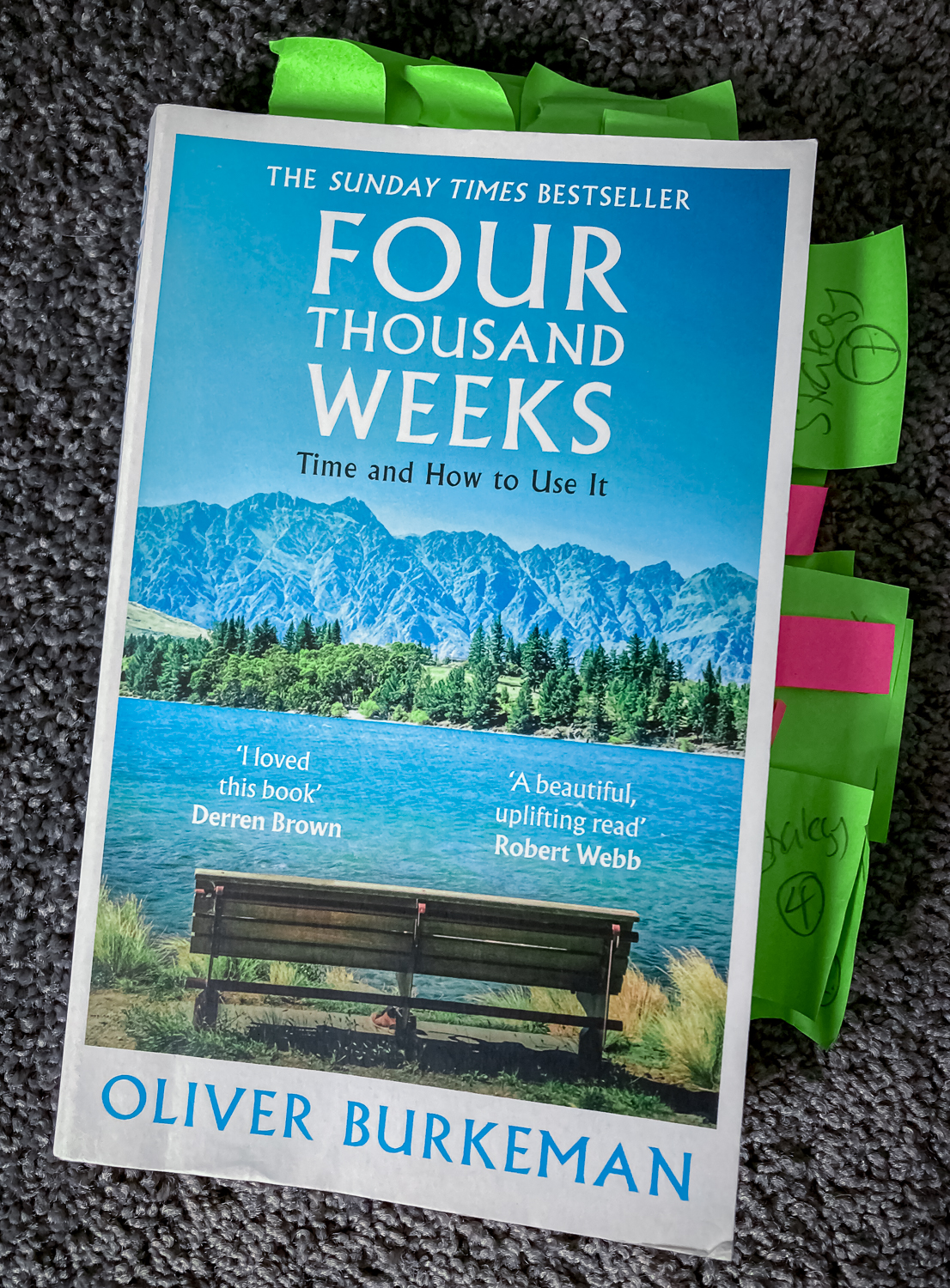Week 9/2024: Four thousand weeks and counting
Week of 26 February 2024
The last official week of summer included a ‘leap day’, which passed by un-noticed.
Sunday was an incredibly windy day and I stayed inside all day. By mid-afternoon I was sick of being stuck inside and went for a walk to the beach.

It was rough.
4,000 Weeks revisited
The book
It’s been a while since I wrote a post about the book Four Thousand Weeks by Oliver Burkeman, and even longer since I actually read the book. (Around 93 weeks if you really want to know.)
If you aren’t familiar with the book, its message is that we only have a finite time in our life span (on average 4,000 weeks). Consequently, there’s no way we have enough time in our lives to do all the things that we want to do. Or even all the things that are important to us. And instead of freaking out about this and despairing that we’ll never get done everything we have to do, let alone the things we actually want to do, we should embrace this.

In the book, Oliver says we can give up expecting to be able to do all the things, because this is impossible. And knowing this, we can go out and do the things we really want to do and that give our life meaning.
We don’t wait to do The Thing until we’ve answered all our emails, or sorted out the kitchen cupboards, or we’ve built a new habit, or we feel the time is right. Because as soon as we do those things, there will be more things we feel like we have to get on top of before we can do The Thing. The time, Oliver says, will never be right, and if we wait for it to be so, it never will be. Which means we will never do The Thing.
(Not) applying it to my life
I wanted to start adopting some of the book’s principles into my own life, but I felt like I had to wait until I’d got a few other things out of the way first.
I know.
. . .
I’d had the book in the back of my mind since I read it, and I occasionally subtracted the number of weeks I’d been alive from the magical 4,000. (Note: This number never gets bigger.)
But my mind still clung to this fantasy that if only I adopted xxx productivity strategy perfectly, and got my email to zero every day, and time blocked my days, I really could do more of the things Oliver told me I can’t do.
Completely delusional.
This week I revisited Oliver’s work with the idea that I’d start to test out some of the things he suggested and write about them on my blog.
The book has suggestions on changes to the way you do things scattered throughout, as well as ten additional tools or techniques to try.
All I need to do is pick one of those things, try it out and write about how it went.
This could be a great project for the blog.
It’s not a project!
“Not so fast, Barb!” says Oliver. (Well, he didn’t actually say this, but I can imagine him saying it.)
Some later material from him says, “I think there’s a tendency . . . that you get to the end of the hours that you’ve invested . . . and then you make a plan to take all the information that you’ve learned and start a new big project of putting it into practice. So . . . [you’ve] given yourself a whole new big list of things to do, [which] falls into the trap . . . where it actually becomes an obstacle to changing your life, because it becomes a whole new project.”
I feel seen.
It’s not a project.
In concluding, Oliver says two things.
First, recognise that what’s needed is not another to-do list that you just have to restructure and everything will be okay. Rather it’s getting comfortable with the fact that changing how you manage your time will be a lifelong journey. And instead of seeking to control your time, you just have to take the next action, and then the next one, and the next one after that.
And you have to start it right now, not at some mythical time in the future when you have sorted your inbox and cleared the to-do list and sorted out the freezer. Because that time will never come. It’s impossible, and if it’s impossible, you don’t even have to try to do it.
Go out and do what is possible.
But . . .
It feels wrong on all sorts of levels but I know it’s right. If trying to organise my to-do lists and get things out of the way hasn’t worked for the last 2,000+ weeks, there’s no reasons to assume it will now.
But it feels deeply uncomfortable. And maybe that’s not a bad thing, because (they say) discomfort is where growth is.
So, what I need to tell you is as soon as I finished this post, I went out and took action on one of my goals.
But you know I didn’t . . . And what’s my excuse?
I don’t have one.
But let’s see if I can turn this ‘must get it all done’ mindset into a ‘just do the thing’ mindset.
Week 9 summary
Habit tracker
- 9.30 shutdown: 5/7 days
- 8,000 steps: 6/7 days
What was the best thing about this week?
I was very excited when Kramstable said he’d got the role he wanted in his college musical.
What did I notice this week?
I wondered what this building would have originally looked like, or would look like without the paint and the signs.

I like it.
What did I learn this week?
From Oliver Burkeman:
The true art of time management is not finding new ways to cram more and more things but wisely and consciously learning how to decide what to neglect, and not feeling guilty about this.
I also learned from an event at work that most surely respondents are middle aged women, so if you want to get input from other groups, you need to find other ways to ask them.
What I’m reading this week
- Presence by Patsy Rodenburg
- Undersong by Hilary Burden